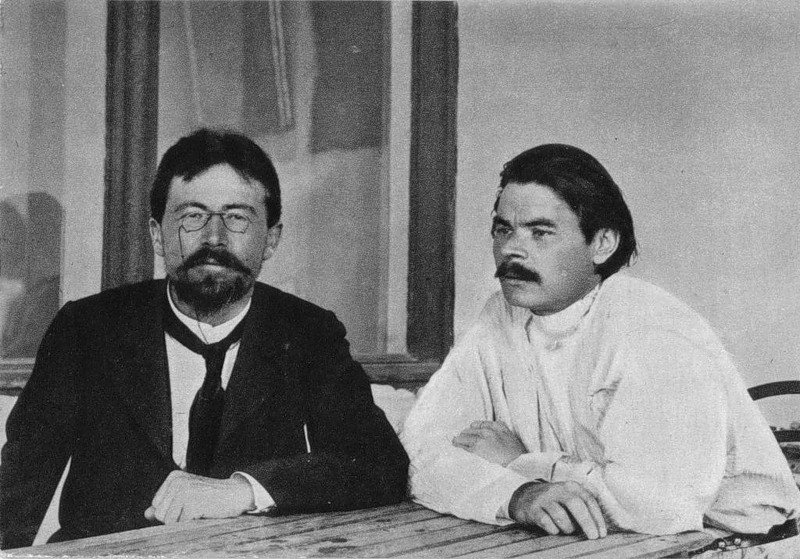 Chekhov and Gorky in Yalta, circa 1900
Chekhov and Gorky in Yalta, circa 1900
In 1898, an exuberant Maxim Gorky wrote the elder Anton Chekhov, expressing his profound admiration for the latter’s work. Their correspondence would continue until Chekhov’s death, of tuberculosis, in 1904.
TO MAXIM GORKY
September 3, 1899, Yalta
My dear Alexei Maximovich,
Greetings to you once again! This is in answer to your letter.
To start with, I am opposed in principle to dedicating books to living people, whoever they may be. I once did so and now feel maybe I shouldn’t have. This is a general observation. Getting down to particulars, I could only consider your dedication of “Foma Gordeyev” to me as a pleasure and honor. But why do I deserve it? However, it’s for you to make up your mind and for me just to thank you humbly. If possible don’t put in anything fancy, i.e., just say “dedicated to so and so” and that’s all.
Here is some more practical advice for you, if you want it: make it a big edition, not less than five or six thousand copies. The book will sell fast. You can have the second edition printed along with the first.
Here is more advice: when you read proof, take out adjectives and adverbs wherever you can. You use so many of them that the reader finds it hard to concentrate and he gets tired. You understand what I mean when I say, “The man sat on the grass.” You understand because the sentence is clear and there is nothing to distract your attention. Conversely, the brain has trouble understanding me if I say, “A tall, narrow-chested man of medium height with a red beard sat on green grass trampled by passersby, sat mutely, looking about timidly and fearfully.” This doesn’t get its meaning through to the brain immediately, which is what good writing must do, and fast.
Now for one more thing: by nature you are a lyricist and your spirit is tuned to melody. If you were a composer you would avoid composing marches. Being coarse and noisy, taunting, accusing frantically – such things are not characteristic of your talent. Consequently you will understand why I advise you in reading proof not to have any mercy on the sons of bitches and curs that flit here and there through the pages of “Life”.
Shall I expect you at the end of September? Why so late? Winter begins early this year, the autumn will be a short one and you should hurry.
Well, sir, keep yourself nice and alive and in good health.
Your
A. Chekhov
P.S.
Performances begin at the Art Theatre on the thirtieth of September. “Uncle Vanya” is being given on the fourteenth of October.
Your best story is “On the Steppe.”
+
FURTHER READING
For Gorky’s “Anton Chekhov: Fragments of Recollections” (1921; trans. by Leonard Woolf), click here.
For a compilation of extant writing advice from “A. Chekhov”, click here.
Excerpted from The Selected Letters of Anton Chekhov, edited and translated by Lillian Hellman, published by Farrar Strauss & Giroux (1984).


